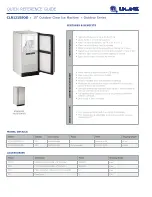
36
8) Repeat steps 4) through 7), if necessary, until the required amount of refrigerant has
entered the system.
9) Close the Refrigerant Access Valve, and disconnect the Hoses, Service Manifold,
etc.
10) Cap the Access Valve to prevent possible leak.
Fig. 3
Cap
Access Valve
Depressed
OPEN
2. BRAZING
DANGER
1. Refrigerant R404A itself is not explosive or poisonous. However,
when exposed to high temperatures (open flames), R404A can be
decomposed to form hydrofluoric acid and carbonyl fluoride both of
which are hazardous.
2. Always recover the refrigerant and store it in a proper container. Do not
discharge the refrigerant into the atmosphere.
3. Do not use silver alloy or copper alloy containing Arsenic.
4. Do not use R404A as a mixture with pressurized air for leak testing.
Refrigerant leaks can be detected by charging the unit with a little
refrigerant, raising the pressure with nitrogen and using an electronic
leak detector.
Note: All brazing connections inside the bin are clear coated. Sandpaper the brazing
connections before unbrazing the components. Use a good abrasive cloth to
remove the coating.
















































